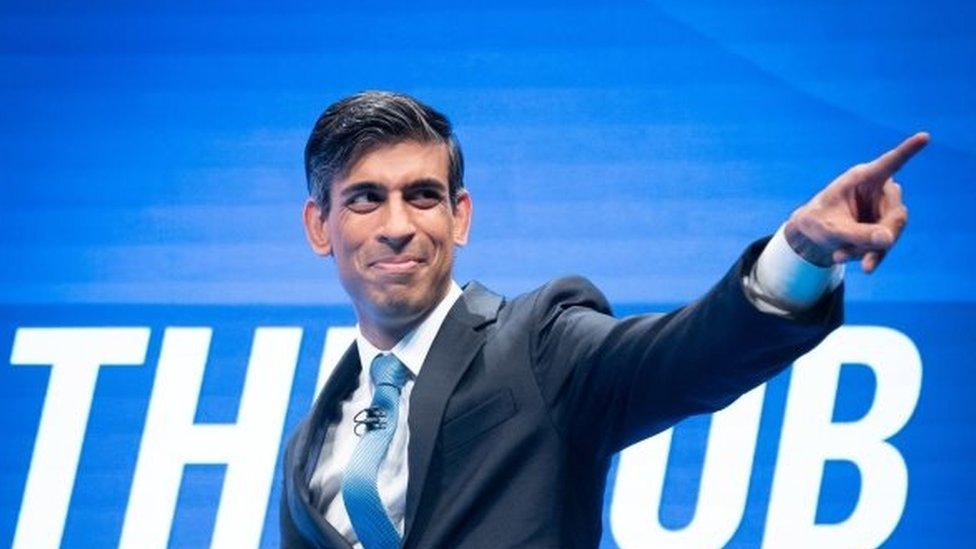Rishi Sunak sprinkles Tory catnip with reassurance to party faithful
- Published

The reception was warm, but not rapturous.
The content for a Conservative audience designed to be reassuring, not radical.
Rishi Sunak bounced onto the conference stage, thumbs up to his boss in the front row, who watched on with the air of a broadly benevolent uncle hoping he'd thrive but maybe not outshine the older man.
The chancellor didn't come with a long list of new policies, or cash promises. That's not a surprise because he'll be at the despatch box in the House of Commons in three weeks with a mammoth review of everything the government spends.
Today was therefore never going to be a big reveal of some vast new whizz bang scheme, or some fundamental change to the nation's finances.
Instead, the speech perhaps was a down payment to the Tory party for Rishi Sunak's own future.
Forget the colossal spending and borrowing of the pandemic. He declared himself a pragmatist, not an ideologue, rather enjoying his role, it seemed, as the man with the country's cheque book when emergency struck.
But what he really wanted the audience to know was that's not what he would choose to do in anything like normal times.
Using the word "belief" more than a dozen times, referring to his political convictions and maybe his belief in himself as well, he sought to reassure the gathered crowd of his low tax, tight-spending, tight-borrowing instincts.
Despite the desire of what one cabinet minister said was 99% of this conference to cut tax, the chancellor even claimed that it would be "immoral" to do so right now because his commitment to the Tory principle of sound money is so sincere.
And he sprinkled some Conservative catnip around, talking of his personal belief in Brexit, long before it was in political fashion, telling how he overcame political warnings about his own career to pursue the cause.
Mentioning the future on multiple occasions, the chancellor will have given the fringes and furtive conversations of this conference plenty of reason to ponder if that future could mean his ambition for Number 10.
Chancellor Rishi Sunak: "Our recovery comes with a cost"
What Rishi Sunak did not come armed with, however, was a chunky response to concerns about the cost of living. Ministers privately fear the government is walking a tightrope, facing a cocktail of costs: rising prices, changes Brexit has brought to some parts of the economy, the world's supply chains bent out of shape because of the pandemic.
The chancellor said this morning that while the government was trying to mitigate some of the problems, there was no magic wand that could wave away the varying tensions.
But ministers' private concerns are intensifying about the prospects for the next few months in the economy.
One of Sunak's colleagues told me today it was a "high risk" strategy, to hope, as the prime minister does, that this is just a period of "adjustment" and that rising wages will ride to the rescue, rather than make inflation worse and end up in a dangerous spiral.
But a close ally of Boris Johnson told me bombastically that the prime minister wouldn't even carry the blame if that's the case.
The Conservatives hope this week draws a political line under the emergency phase of the pandemic. The era that led him to make decisions that would be the stuff of a Tory chancellor's nightmare.
But that emergency could be replaced by months of turbulence in the economy that might throw up less than tempting problems of their own.
